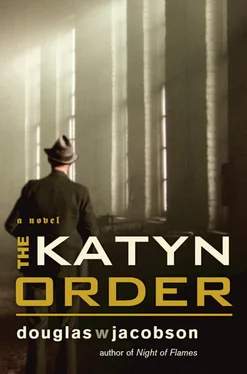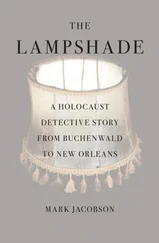Eight months ago I descended into hell. I have seen the abyss, the dark chasm of depravity into which man can sink. And I am terrified. I am terrified the world does not know what is happening here. I fear most will not live to tell their story, so I will tell mine and pray that it will emerge from the darkness —that the world may know.
Exhaustion set in and Adam closed his eyes thinking about the afternoon with Natalia, wondering if he had finally emerged from the darkness.
When the bus shuddered to a halt at the station in Nowy Targ, most of the passengers collected their battered suitcases, baskets and canvas bags and trudged off the vehicle. Adam remained in his seat. The driver stood outside, smoking a cigarette, chatting with the departing passengers. Eventually a trickle of new passengers boarded the bus, including a stocky man in overalls and a faded plaid shirt, carrying a wicker basket. A few minutes later the driver tossed his cigarette butt on the ground and climbed back into his seat, and the bus lumbered on.
Adam was wide awake now, his senses alive as he sat on the stiff leather seat waiting anxiously for whatever was coming next. Reading his uncle’s story and knowing that he was still alive had filled him with a resolve and a sense of purpose that he hadn’t felt since Warsaw.
I fear most will not live to tell their story, so I will tell mine and pray that it will emerge from the darkness—that the world may know.
Banach’s words drummed in Adam’s head, over and over, and he now knew, deep in his soul, that no matter what else happened, the entire story—the bizarre encounters with the madman Hans Frank, the extermination of the Jews and, most important, the discovery of the Katyn Order—had to be preserved and shared with the civilized world. For the first time in as long as he could remember, Adam felt some comfort. If nothing else came of the years of gruesome warfare, the years of mindless death and destruction—finding Natalia and being reunited with his uncle would be enough.
The road grew narrower and the hills steeper as they climbed higher into the Tatra Mountains, the last purple hues of daylight sliding into darkness. The bus bounced along the pockmarked road for another half hour before finally shuddering to a stop. The man with the wicker basket stood up and moved to the door. Adam followed him off the bus.
They appeared to be in the middle of nowhere, and as the sound of the bus’ laboring engine receded beyond the hills, the blackness of the mountain night closed in around them though the stars were incredibly bright. The man moved closer, and Adam tensed, clenching his right fist. He wished now he’d accepted the Browning 9mm pistol Natalia had offered. He’d insisted she keep it for her own protection. He hoped he wouldn’t regret it.
The man nudged Adam’s arm and said, “Follow me and stay close. It’s not far, but the road falls off into a ditch.”
They trudged along a gravel road in the darkness for perhaps a quarter of an hour. The hair on Adam’s neck bristled. He darted his eyes left and right, though he couldn’t see a thing in the black night.
Then a shadowy form emerged through the gloom. It turned out to be a modest building with a peaked roof, topped by a cross. Adam waited outside while the man pulled open a creaking wooden door and disappeared into the dark void. A moment later he reappeared in the doorway, illuminated by a kerosene lantern, and beckoned Adam to enter.
It was a mountain chapel, constructed of rough stones and hand-hewn beams, with a stone altar and three wooden pews. The stocky man looked at Adam and tipped his hat. “You may call me Tytus.”
“And you may call me Wolf,” Adam replied. At the front of the small chapel, an intricately carved crucifix was attached to the stone wall above the altar. The Christ figure had a sorrowful expression. “What do we do now?” he asked.
Tytus pointed to the small octagonal window above the crucifix. “We wait. They’ll see the light in the window.” He looked at Adam curiously. “You’re an American?”
Adam nodded, assuming that Jastremski had told him. “But I was born in Krakow. I came back in ’36.”
Tytus snorted. “I won’t ask why. Jastremski told me a bit about your background, and I don’t need to know any more. It’s not healthy.” He was silent for a moment then said, “You know the Górale?”
“I’ve read about them and met a few during a camping trip up in this area back in the summer of ’38.”
Tytus pulled an intricately carved pipe out of his shirt pocket. He took his time filling it with pungent, stringy tobacco, tamping it down and lighting it. He appeared to be in his mid-forties, with thick fingers, jet-black hair and the weathered complexion of a man who made his living working outside. He took a couple of puffs from his pipe, then pointed the stem at Adam. “I’ve known the Górale all my life. They come down to the lower valleys every year in the spring to work on the farms during the planting season. They come back in the fall for the harvest. In between they pretty much keep to themselves up in these mountains, tending their herds. If you’re honest with them, they will do anything for you. They’ll open their homes, share their food, give you clothing. But they can be vindictive and cruel as hell if they are deceived. Honor is everything. I don’t know what your business is up here, and I don’t want to know, but I’ll tell you this. Do not lie to them.”
He puffed on the pipe, then pointed it at Adam again. “They’ll be suspicious of you at first. They always are with outsiders; it’s in their blood. But be patient and do not lie to them. Not if you want to get out of here.”
“I know they fought as partisans during the war,” Adam said, “and the Nazis made them pay.”
Tytus nodded, exhaling a cloud of sweet-smelling smoke that helped take away the dampness. “Freedom is everything to them. No matter what the Germans did to them—and the Russians later—the Górale fighters kept the routes open all the way to Slovakia. A lot of weapons and contraband passed over these mountains.”
“And Polish soldiers,” Adam said, remembering rumors of the escape routes back in Warsaw.
Time passed, the heat from the lantern slowly taking away the chill of the night air and the clammy stone walls. Then Adam heard sounds in the distance, the muted clopping of hooves and creaking wagon wheels. The sounds drew closer, until they stopped outside the chapel. Tytus held up his hand, signaling for Adam to remain where he was. A moment later the door creaked open, and a figure filled the doorway.
He was a huge man, with a barrel chest, broad shoulders and long, flowing blond hair. He wore a wide-brimmed felt hat, a black vest over a white linen shirt and coarse, heavy trousers with an embroidered, red strip down the outside of each leg. The big man glared at Adam suspiciously. Then he turned to Tytus and nodded. Without a word, he motioned for them to follow and stepped back into the night.
16 JUNE
DMITRI TARNOV RECEIVED A TELEPHONE CALL in his office early Saturday morning. “We’ve heard from our contact at the library,” the voice on the other end said. “Jastremski had a visitor yesterday.”
“Yesterday? What the fuck is wrong with you?” Tarnov roared. “Why in the hell didn’t someone call me right away?”
Silence.
Then the voice stammered, “I don’t… Someone should have—”
“Nichivó! Forget it, you moron. Who was it? Anyone she knew?”
“Nyet. Nobody she’d seen before. She said he was well-dressed and wore eyeglasses, looked like a business man.”
Tarnov slammed the phone down.
Читать дальше












